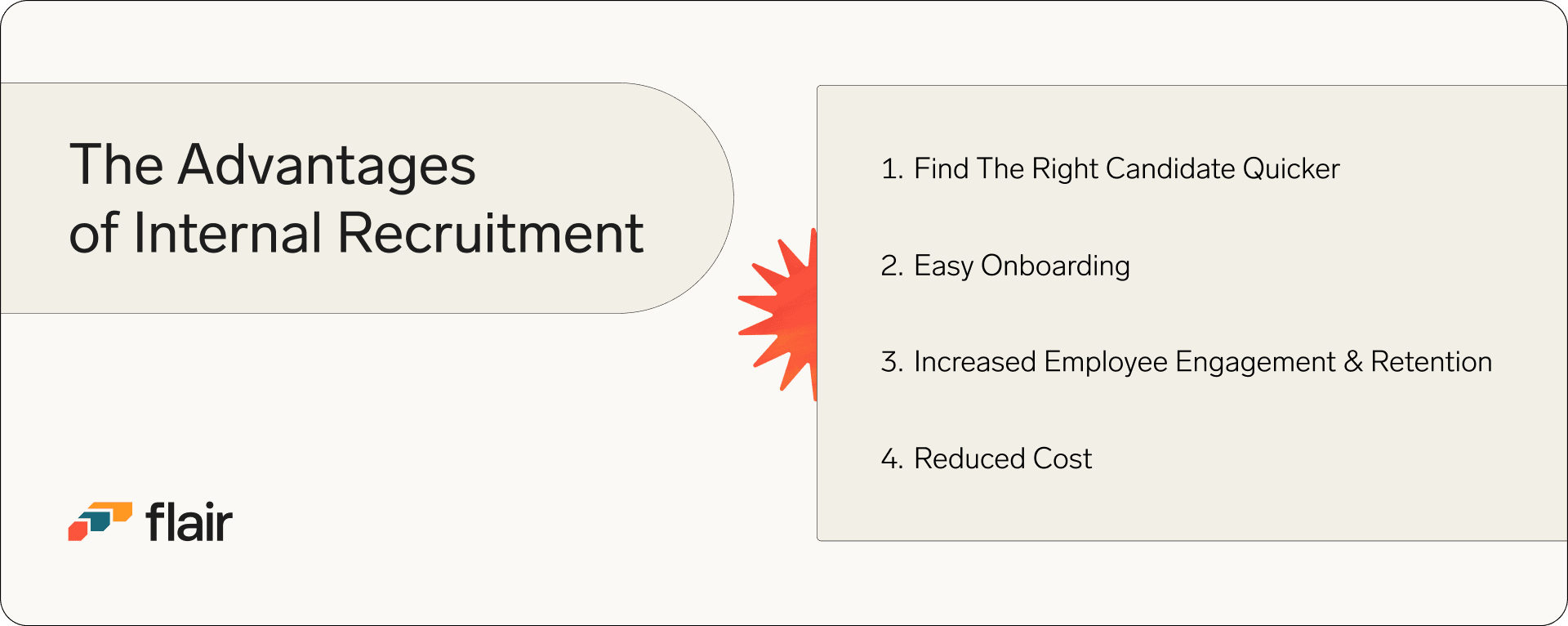100 Job Interview Statistics: First Impressions and Interview Processes
Master your next job interview with expert tips and statistics that will boost your confidence and impress potential employers.
- 16 Apr 2024
- Max 13 min read
The Number One HR Solution on Salesforce
Hiring the right person for a job can be tricky, but you don’t always need to look far and wide for the perfect fit. Within your own company, exists a pool of talented individuals who might already possess the ideal qualities and abilities.
This method of finding employees is called internal recruitment and it has plenty of benefits. For starters, you won't need to go through the same lengthy process as with external recruitment.
Plus, you'll gain a better insight into their skillset since you already know them on a professional level.
Though it may seem like the obvious choice to look outside first when trying to fill a role, internal recruitment should not be overlooked, especially with staff turnover rates high and talent shortages looming.
In fact, Forbes reports that 49.5% of U.S. employers plan to hire from within or promote current employees to fill roles in 2023. According to LinkedIn’s Future of Recruiting 2023 report, 75% of recruiting pros say internal recruiting will be an important factor shaping the future of recruiting over the next 5 years.
If you're new to the process of internal hiring, don't worry – we're here to help. We've compiled some useful tips that will make it easier to find the right candidate. They just might be hiding in plain sight!
Internal recruitment involves trying to fill a new job role from existing staff members, rather than looking outside the organization for external candidates. For instance, there's no need to advertise on job boards and other external mediums.
Recruiting internally can often be done within a specific team or even by moving someone from another part of the company. As a result, internal hiring can provide access to any employee for an open position.
This is the primary distinction between external and internal hiring processes. There are some differences in the method too, but this mainly involves adjusting the overall recruiting process accordingly.
You may have already dabbled in several kinds of internal recruiting without noticing it. Think of when an employee gets a promotion, a temp worker transitions to permanent, or an experienced teammate is referred by another colleague. These are all examples of internal recruiting! It's really just a shift from one role to another, and can often be seen as a positive move, such as in a promotion or transfer.
Recently, many businesses have been turning to internal recruiting for the majority of their hiring needs. LinkedIn’s Global Talent Trends report found that internal mobility is trending upward in a majority of industries, via promotions and internal role transfers. While some organizations use this method alongside external recruitment, others rely solely on internal recruitment for their full-time job postings.
What does this mean for you? Well, companies that use internal recruitment often find workers who are more productive and profitable faster than those recruited from outside sources. It also tends to be a safer option than hiring from outside since the danger of making a poor hiring decision – one that might result in having to backfill the position again if they leave shortly afterward – is greatly reduced.
Hiring internally can be great for boosting employee morale and reducing turnover. Team members will have more incentive to stay with your organization if there are opportunities to progress. Another great selling point is that the costs associated with this process tend to be lower than with traditional methods.
Of course, internal recruitment is not always the right solution when it comes to hiring – but there are plenty of advantages, and certain situations where it really outperforms hiring externally. Let’s dive in and examine why, how, and when you should turn to internal recruitment.
You may be wondering what the advantages of internal recruitment are compared to its alternative. Well, you’ll be pleased to hear that there are several fantastic benefits. These can be seen throughout your human resources processes, as well as in other areas. Some of the biggest advantages include:
Onboarding new hires can take up a lot of time and effort. You need to get them trained properly, help them adjust to the company culture, and complete background checks. With current employees, onboarding is almost a non-issue.
When employees know that their hard work is being rewarded, they'll be more engaged in their roles. Implementing internal promotion schemes and referral bonuses will help with employee retention, too. According to LinkedIn’s Future of Recruiting 2023 report, employees at companies with high internal mobility stay 60% longer than those with lower rates.
By hiring internally, you don't need to go through the long process of creating a job ad. Although you still have to create a job description for the role, you don't have to worry about advertising expenses and other costs related to the job listing.
Thanks to performance reviews and having an inside knowledge of current employees’ capabilities, you’ll be able to hire someone who has the exact skillset needed for the job in less time. This gives you peace of mind that you'll find the right candidate for the position. Plus, when recruiting from within your organization, you can rest assured that the candidate will already be a great cultural fit.
Having so many great benefits in mind, it's easy to understand why so many businesses prefer internal recruitment.

Internal recruitment is a great way to fill positions in your company and promote from within. Although incredibly beneficial, there are also a few drawbacks that you should be aware of. Let’s take a look at some hurdles that might need to be overcome.
Internal hires may have the skills you're looking for but might not be able to bring any new perspectives or creative solutions to long-term problems. Fresh ideas can make all the difference when it comes to workplace creativity and problem-solving.
If you decide to limit your hiring decisions to only internal candidates, you could potentially have a smaller pool of eligible candidates who could step into the role. That might result in fewer options or even a lack of qualified individuals.
Any time a person is moved from their current role to another position you'll need to fill the vacancy they leave behind with a new employee.
These points don't weigh heavily against internal recruitment's benefits, but they should still play a part in your decision-making process. You'll need to find ways around any challenges in order to make the most out of this hiring option.
While external and internal recruitment processes have many similarities, there are a few things to take into account if you’re new to hiring internally. But never fear, you’re just a few simple steps away from your new internal hiring process.
It’s easy to think that hiring internally is exactly the same as doing so externally, and despite the many similarities there are a few relatively common mistakes that are to be avoided when implementing your internal recruitment process:
Many applicants want to follow a specific career path and would jump at the chance to do so within their current company via promotions or applying for different roles. Without clear communication, however, employees may believe that only external applicants can apply. A little encouragement can go a long way.
Just because somebody already works for you doesn't mean you shouldn't screen them for a new job position. The good news is that this task should be much easier than with an external candidate. Alongside the usual screening methods, you'll have access to performance reviews, which should provide more accurate information on if they're suitable for the role.
A strategy is vital to the success of your internal recruitment process. Not having a defined plan in place can lead to mistakes and confusion between recruiters and applicants.
Some individuals who apply for an internal role may not be completely qualified. Instead of simply rejecting them, try offering constructive criticism. This will help them to improve and encourage them to apply for other roles in the future.
Avoiding these common pitfalls in your internal recruitment process will ensure that you're getting the most qualified candidates possible for any new role – and that’s a recipe for long-term success.
After implementing a successful internal recruitment strategy, the next challenge is to keep improving it. With constant technological innovation, changing job markets, and shifting priorities for both companies and employees, it’s so important to stay on top of your recruitment approach and keep it current. Here are just a few ways you can keep striving to make your internal recruitment process the best it can be.
Internal recruiters need to have an astute eye for finding the right talent. As an internal recruiter, you have the unique ability to make accurate evaluations of your future applicants. Pay close attention to employee strengths and weaknesses and whether they'd be a good fit for certain roles, and keep reviewing employees' performance and achievements in their current positions.
References are a great way to judge an employee's ability and you’ll absolutely benefit from checking in regularly with managers and supervisors to get a good inkling of any rising stars!
Current employees often have their own understanding of a newly opened position and the company culture. A good internal recruiter can demonstrate refreshing and encouraging values that employees might not know or have considered.
Since internal recruiters are often the first point of contact for open positions, it‘s crucial to make make a great first impression. Work on your communication skills so you can be articulate and persuasive without coming across as disingenuous.
A failure to convey the full worth of a position to internal candidates can ruin the entire internal recruitment effort, meaning that you will need to look externally.
Having strong organizational skills is just as important as having interpersonal ones. It's crucial to manage your recruitment process in an efficient, reliable, and methodical way for the best possible results. Timing is an extra-important part of this process, so make sure that plan ahead and take into account all the different schedules involved.
Employees generally have an accurate understanding of their company culture. As an internal recruiter, it's essential to help improve that. One crucial aspect of this is identifying any inclusivity-related shortcomings within the company. Even if a candidate is an excellent fit for a position, they might be discouraged from applying if they feel like they aren’t fairly represented or appreciated within the company.
To enhance company culture, consider organizing outreach programs and making connections that will better position your company to embrace a more inclusive and diverse culture.

Internal recruitment can definitely boost a business's overall productivity and efficiency, but what does it mean for employees? They’re the people that drive success after all. The good news is there are a whole host of benefits for your team, too.
When employees get the message that their HR department is considering them for potential roles, they will likely feel an extra boost of motivation. Internal recruitment can be a gentle way to inspire employee productivity and loyalty.
On the other hand, external recruitment can make employees feel like there’s no room for growth within their job. Incredibly, a study by LinkedIn found that almost one-quarter of individuals that had departed their previous positions did so because they weren't promoted. Job-hopping has become a norm in many fields, and it’s up to employers to give their employees more reasons to stay.
Keeping employees engaged is key to creating a productive workplace. When employees are feeling bored, it can quickly lead to decreased commitment, and in some cases can even drive them to seek out new opportunities elsewhere.
In LinkedIn’s Future of Recruiting 2023 report, candidates ranked advancement and skill development among their top 5 priorities when it comes to choosing an employer.
When employees feel like their current role isn't living up to its potential, they may start looking for other opportunities. If positions are seemingly dull or unchallenging, it could even put a damper on internal recruitment. To stoke enthusiasm and motivation within your team, be sure to market new roles as exciting chances to grow, explore, and develop. Millennials in particular thrive when presented with engaging and fulfilling tasks that keep them busy and motivated.
While you might have a good idea of which employees would be the best fit for a new position, you might be selling yourself short if you ignore other divisions.
Modern employees are incredibly diverse in their skill bases and qualities, and no one needs to be limited to a single department. Think outside the box! You might find that a copywriter could make for a convincing sales rep. Talk to your team regularly to uncover hidden opportunities. You might just find your next top talent where you least expect it.
Creating a cross-departmental approach to filling new roles is beneficial for many reasons. Not only does it encourage fresh perspectives, but it's an excellent way to keep your team motivated and engaged. By encouraging employees to move between different departments, you create a more connected workplace free from silos, providing plenty of opportunities for upskilling along the way.
As you've seen, internal recruitment comes with a whole host of benefits, but there are certain situations in which it really shines. Let’s take a look.
Not all HR departments have the budget to search extensively for candidates. Internal recruitment offers an affordable option that allows you to quickly fill positions without breaking your budget.
It's important to have someone who knows their stuff. Sometimes the best person for the job is already part of the team. Internal recruitment can help you find experienced and knowledgeable employees who understand your processes and departments well.
Each job requires a particular set of skills, and it's highly likely that there are already people in your organization with those talents. With internal recruitment, you can rely on familiar individuals with proven track records instead of taking a chance on external candidates.
When time is short, then internal recruitment can save the day! You don't need to go through a lengthy recruitment process — you know employees' capabilities and can quickly fill out a role without time-consuming admin.
Internal recruitment can be a cost-effective and quick way to fill any open roles in your organization, especially for positions that require immediate attention.
Turning to your existing workforce first before considering external candidates means you’re able to fill those roles with experienced employees who already know the company culture inside out. It's also a great way to help motivate existing employees, giving them the chance to take on new responsibilities and develop new skills.
Of course, this method should be seen as a complement to the other hiring and staffing processes – not a replacement. As your organization continues to grow and succeed, you'll definitely need to be recruiting new talent externally too! All in all, internal recruitment should be a crucial part of any good talent acquisition strategy, and as you continue to evolve your recruitment methods, you'll know when an open role calls for an internal or external approach.
Either way, you can count on flair to support you, at every point in your organization's recruitment journey. Book a demo today and we'll show you how!
Join flair’s newsletter to receive the latest tips & trends in the HR world.

